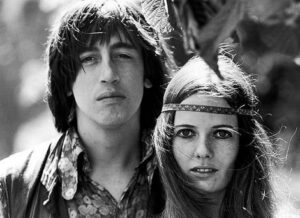 Sadly, there are fairly few people left who understand what the Hippies were really about. Mostly people remember the Hollywood version: pot-smoking, political protesting and clumsy dancing. The actual Hippies, especially the early Hippies, were a much different group. They were interesting and brave people: people very much worth remembering.
Sadly, there are fairly few people left who understand what the Hippies were really about. Mostly people remember the Hollywood version: pot-smoking, political protesting and clumsy dancing. The actual Hippies, especially the early Hippies, were a much different group. They were interesting and brave people: people very much worth remembering.
Who Were The Hippies?
The Hippies were preceded by the Beat movement, a decentralized and spontaneous movement of young people who rejected the conformity of the 1950s – a very “corporate” time.
The Beats were, as one writer put it, “a whole bunch of people, of all different nationalities, who came to the conclusion that society sucked.”
Now, there are always people complaining about things, and there is always a stew of rehashed ideas simmering, but the early and serious Hippies were different, in that they believed that they could make life better, starting right now. And they went to work doing so. That was the great difference between the Hippies and most other movements – the Hippies acted.
Sure the Hippies grew their hair, painted their cars and wore strange clothing. And yes, a lot of them latched onto silly ideas, but their virtues were far more important. To start with, the Hippies, rather than cowering at the thought of being different, went out of their way to show their difference, and there’s something transformative about that. It opens doors in you.
Now, let’s forgo Hippie history and get right into their wisdom, beginning with the thoughts of two early Hippies. First, some thoughts direct from the early days, care of Bob Stubbs:
We have a private revolution going on. A revolution of individuality and diversity that can only be private. Upon becoming a group movement, such a revolution ends up with imitators rather than participants.
And another, written after the fact, from Debra Jan Bibel:
Yes, it was sex, drugs, and rock & roll, but it was also spirituality and consciousness studies that eventually led to environmental/ecology movements, cognitive neuroscience, and psychoimmunology… The hippie wannabes spoiled the scene, did not understand the ideologies nor the proper use of entheogens. The popular image of hippies was of them, not the more thoughtful, experimental, and realized post-Beats, the pioneers who led the way.
From the early hippie habit of action came many of the better developments of the 1960s: New thoughts, new perspectives, the belief that they could live and thrive as individuals, not as nameless insects in a giant hive.
But, more important than anything else, the early hippies discovered that they could activate their own will… that they could live their way, create the things they loved, and ignore the expectations of the state-tribe.
Once people reclaim their will, new, beneficial and interesting things tend to sprout up.
The Thoughts They Sought Out
The Hippies, and even though they were generally intelligent kids, were young, and knew they lacked perspective. And so they turned to older, experienced people. Perhaps the best of these older teachers was Buckminster Fuller. Here are some of his thoughts:
Politicians are always realistically maneuvering for the next election. They are obsolete as fundamental problem-solvers.
I seem to be a verb.
The end move in politics is always to pick up a gun.
You’ll see from this next one that Fuller makes up his own words. Bear in mind that he was a very serious engineer, so these odd word combinations are used with precision. You’ll have to read the passage slowly, but if you do, you’ll see that these are coherent thoughts.
The youth of humanity all around our planet are intuitively revolting from all sovereignties and political ideologies. The youth of Earth are moving intuitively toward an utterly classless, raceless, omnicooperative, omniworld humanity.
Children freed of the ignorantly founded educational traditions and exposed only to their spontaneously summoned, computer-stored and -distributed outflow of reliable-opinion-purged, experimentally verified data, shall indeed lead society to its happy egress from all misinformedly conceived, fearfully and legally imposed, and physically enforced customs of yesterday.
They can lead all humanity into omnisuccessful survival as well as entrance into an utterly new era of human experience in an as-yet and ever-will-be fundamentally mysterious Universe.
You can also see that Fuller is deeply concerned with change in the world. Here are several more on that subject:
We are powerfully imprisoned in these Dark Ages simply by the terms in which we have been conditioned to think.
Dear reader, traditional human power structures and their reign of darkness are about to be rendered obsolete.
Whether it is to be Utopia or Oblivion will be a touch-and-go relay race right up to the final moment. . . . Humanity is in ‘final exam’ as to whether or not it qualifies for continuance in Universe.
I’ll close with a practical thought from Fuller. This is one that the Hippies took seriously, and one that all of us should be taking seriously:
You never change anything by fighting the existing. To change something, build a new model and make the existing obsolete.
So…
Regardless of how we wear our hair and our clothes, we should all, like the Hippies, act to make life better: without permission and now.
**
Paul Rosenberg
freemansperspective.com
